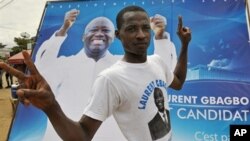Election officials in Ivory Coast have said the country's presidential poll will once again be pushed back.
The head of Ivory Coast's electoral commission, publicly confirmed Wednesday a "slight delay" in the country's much-anticipated presidential poll, which has been postponed several times since 2005.
The vote is an attempt to find a lasting political solution to nearly a decade of internal conflict in the once stable West African nation.
Recent setbacks have prompted observers to fear that the November 29 poll date would be unrealistic and that scrambling to make that deadline would result in a flawed vote.
Independent analysts have said an early 2010 vote looks more realistic, while officials continue to point to the progress being made.
The United Nations Operation in Ivory Coast announced Wednesday that it has begun distributing the provisional voter lists to polling stations around the country, bringing it one step closer the poll.
Marie Okabe is the spokesperson for the U.N. Secretary General. "The special representative said the handover was an important step toward reaching the end of the crisis in Côte d'Ivoire. He also hoped that the remaining task in the electoral process - including printing and handing out of voter cards -- would be done quickly," she said.
The United Nations said the provisional list will officially be published when it has reached all of the country's 11,000 polling stations. Its distribution will kick off a five-week appeals process before the voter list can be finalized.
The provisional list contains the names of more than six million voters. The nationality of half million of those voters is still being disputed.
Voter registration issues, particularly issues of nationality and voter eligibility, have prompted Ivory Coast to push back the election several times since President Laurent Gbagbo's mandate ran out in October 2005.
Civil war cut the nation in half in 2002, after rebels attempting to overthrow President Gbagbo took control of the northern part of the country. The country has since missed deadlines for presidential elections set by 2007 and 2008 peace accords that created a transitional, power-sharing government.
Questions of nationality were divisive during the crisis and remain sensitive. As the country moves towards the poll, government officials have emphasized that confirming the validity of voter registrations is essential to ensuring the success of the election.
The publication and approval of the voter list, though a crucial step, is not the only obstacle remaining. The disarmament of the country's former rebel factions, set to be completed before the vote, is also behind schedule.
News
Ivory Coast Elections Delayed Again
update

Election officials say country's presidential poll will once again be pushed back




